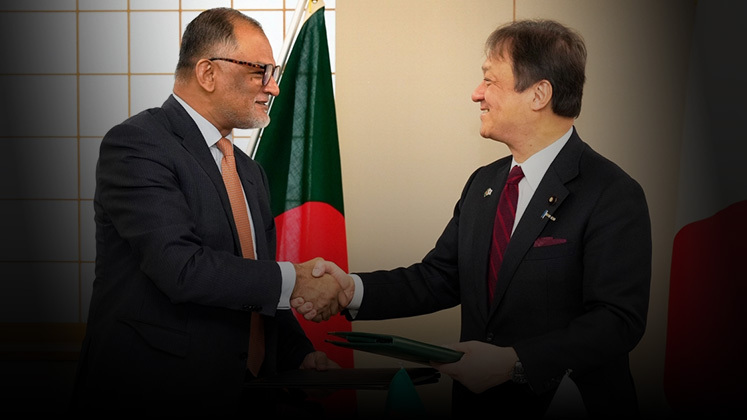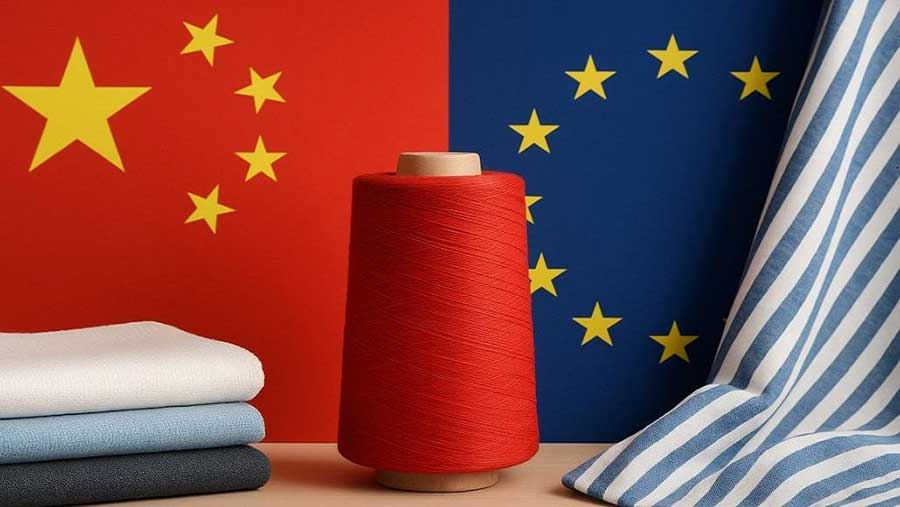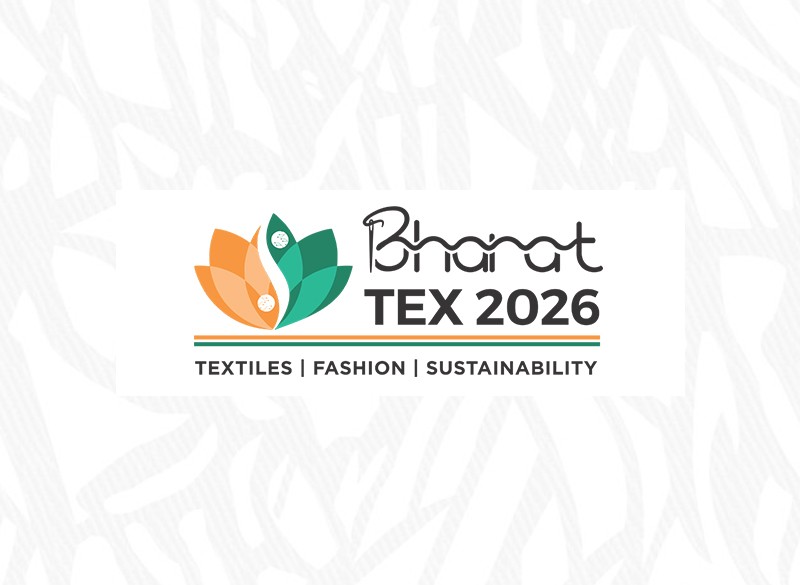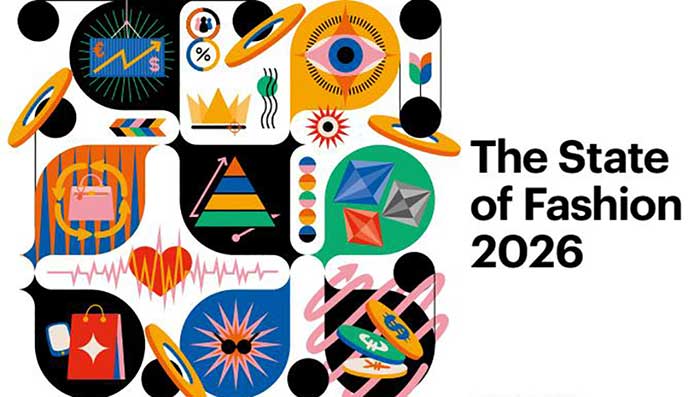FW

The signing of the Bangladesh-Japan Economic Partnership Agreement (EPA) on February 6, 2026, marks a transformative moment for South Asia’s textile and apparel corridor. While India has operated under a similar bilateral framework since 2011, Bangladesh’s latest deal is being widely recognized as a more agile and commercially intelligent architecture. Unlike previous pacts, this agreement is designed not merely to preserve Bangladesh’s export base as it approaches graduation from Least Developed Country (LDC) status. Instead, it positions Dhaka to aggressively capture market share from China, aiming to become Japan’s leading high-volume apparel sourcing partner.
Redefining Rules of Origin
The critical differentiator between India and Bangladesh lies in Rules of Origin (RoO). India’s 2011 Comprehensive Economic Partnership Agreement (CEPA) with Japan has largely underperformed in apparel due to its double-stage transformation requirement both the fabric and garment must be domestically produced for duty-free eligibility. This restriction has historically constrained India’s ability to compete effectively in Japan’s high-volume apparel market.
Bangladesh’s 2026 EPA, by contrast, introduces a Single-Stage Transformation rule. This enables Bangladeshi factories to import high-quality yarns or synthetic fabrics from global leaders including Japan, China, and Korea and still qualify for duty-free exports after local garment production. This effectively eliminates the fabric bottleneck that has hindered India, providing Dhaka with a significant competitive advantage.
India vs Bangladesh in the Japanese market
Despite India’s vertically integrated textile ecosystem, spanning cotton cultivation to finished garment, the country has failed to convert this advantage into Japanese market dominance. Bangladesh, though more reliant on imported raw materials, has captured nearly four times the export value of India in this corridor.
Table: Apparel & textile exports to Japan (2025-26)
|
Apparel/Textile trade |
India (CEPA since 2011) |
Bangladesh (EPA 2026) |
|
Current Export Value (Japan) |
$354 mn (2024) |
$1.41 bn (FY25) |
|
Apparel Market Share in Japan |
1.20% |
5.50% |
|
Projected 2030 Market Share |
2.50% |
10.00% |
|
Primary Fiber Base |
80% cotton |
33% synthetic/MMF shift |
|
Inbound Japan FDI (Textiles) |
$45 mn (annual) |
$250 mn (projected) |
The figures reveal Bangladesh’s rapid growth despite lower domestic fiber production. While India relies heavily on cotton, Bangladesh’s shift to man-made fibers (MMF) and the flexibility of importing high-performance fabrics gives it a clear edge in the Japanese premium and technical apparel segments. The projected inflow of Japanese FDI underscores Tokyo’s confidence in Bangladesh’s ecosystem.
Capturing the China Plus One opportunity
Bangladesh’s timing is propitious. Japanese retailers such as Fast Retailing (Uniqlo) and Adastria are actively diversifying away from China in search of alternative sourcing partners. China’s share of Japan’s apparel imports fell from 55 per cent to 46 per cent in 2025, while Bangladesh recorded 17.2 per cent year-on-year growth in Q1 2025 alone.
One important factor in this momentum is the Bangladesh Specialized Economic Zone (BSEZ) in Araihazar, which provides a Japan-standard ecosystem. Unlike India’s fragmented textile clusters, BSEZ hosts Japanese companies such as Sumitomo Corporation and NICCA Chemical, offering cutting-edge dyes, machinery, and compliance frameworks aligned with Tokyo’s stringent quality benchmarks.
High-tech synthetics at Araihazar
A Dhaka-based apparel manufacturer recently partnered with NICCA Chemical to establish a high-speed production line for technical outerwear within BSEZ. Previously, importing Japanese-developed synthetic waterproof fabrics would have incurred a 10 per cent duty upon re-export to Japan. Under the new EPA, this circular supply chain is entirely duty-free.
This policy change has lowered landed costs for Japanese retailers by 12 per cent, making Bangladesh more price-competitive than Vietnam in the premium synthetic segment. Analysts see this as a potential blueprint for scaling high-value exports in other functional wear categories.
From volume to value
The textile and apparel sector remains Bangladesh’s economic backbone, contributing over 80 per cent of total export earnings and approximately 10 per cent of GDP. Today, the country is the world’s second-largest apparel exporter, but its strategy is shifting from sheer volume to value-led growth, emphasizing man-made fibers, functional garments, and premium segments. Environmental compliance and automation are central to this evolution. With over 200 LEED-certified factories, the highest concentration globally Bangladesh is attracting international retailers seeking sustainable, high-tech production. By 2035, the industry aims to reach $100 billion in annual exports, leveraging vertical integration, automation, and aggressive market diversification.
A new regional hierarchy in apparel trade
Bangladesh’s 2026 EPA with Japan illustrates the power of trade architecture over raw resource endowment. By combining single-stage flexibility, specialized zones, high-tech partnerships, and sustainability, Dhaka is emerging as a formidable competitor in East Asia’s apparel market. For India, the lesson is clear: supply chain control alone is insufficient. Future competitiveness will depend on regulatory flexibility, strategic zone development, and alignment with buyer requirements a framework Bangladesh has now perfected.
A massive multi-agency enforcement operation in Newcastle has exposed a significant ‘compliance gap’ within the regional textile sector, sending shockwaves through the broader retail landscape. Executed in early February 2026, the raids on approximately 12 garment manufacturers uncovered severe labor law violations, including the employment of dozens of undocumented workers and hazardous factory conditions that posed immediate fire risks.
The retail accountability crisis
The fallout has been immediate for major retail chains, as investigators discovered large quantities of finished apparel labeled for high-profile brands. While these retailers have historically relied on third-party audits, the Newcastle probe suggests that ‘staged compliance’ fronts are becoming increasingly sophisticated. Industry data indicates, the UK textile sector faces a £4 billion productivity loss annually due to such illicit activities and labor vacancies. Deputy Minister Alexandra Abrahams emphasized that industrial growth cannot be predicated on illegality, calling for ‘meaningful due diligence’ rather than just reliance on administrative oversight.
Tech-driven deterrence and resilience
To combat the rise of these ‘shadow factories,’ the industry is accelerating the adoption of Digital Product Passports (DPP) and blockchain-based traceability. Under the UK Textiles Pact Roadmap 2026-2030, manufacturers are now required to align with eight new circularity indicators to ensure ethical labor standards. This shift is critical as the domestic market enters a bullish period, with orders rising by 20 per cent, yet recruitment intentions are faltering due to rising employment costs. By integrating AI-driven demand forecasting and RFID tracking, compliant manufacturers aim to out-compete illicit operators, securing a supply chain that prioritizes human rights over predatory margins.
Newcastle serves as a historic hub for the clothing and textile value chain, specializing in fast-fashion apparel and technical uniforms. Currently, the region is undergoing a transition toward circular manufacturing under the R-CTFL Masterplan. Despite a 0.5 per cent growth forecast for 2026, the sector faces challenges from non-compliant entities that distort competition and undermine the integrity of the £64 billion domestic textile shipments. The enforcement actions highlight a systemic shift toward mandatory transparency as the UK pushes for a more resilient and ethical manufacturing base.
In a move that formalizes the intersection of Big Tech and regenerative agriculture, Microsoft has signed a landmark offtake agreement with the Indian climate-tech firm Varaha to purchase over 100,000 tons of carbon dioxide removal (CDR) credits. Announced in early 2026, the deal leverages Microsoft’s AI infrastructure to transform the economics of smallholder cotton farming across Maharashtra and Rajasthan.
Biochar integration and carbon monetization
The partnership centers on the deployment of 18 industrial biomass gasification reactors that convert cotton stalks - traditionally agricultural waste often disposed of via open-field burning—into biochar. This charcoal-like substance serves as a stable carbon sink, locking biogenic carbon into the soil for centuries. For India’s textile sector, which contributes to nearly 25 per cent of the world's cotton production, this creates a dual-revenue stream. Farmers now receive direct payments for their biomass while benefiting from the enhanced soil moisture retention and reduced fertilizer requirements that biochar application provides.
AI-enabled supply chain traceability
Beyond carbon sequestration, the initiative utilizes Microsoft’s Azure Data Manager for Agriculture to provide high-fidelity traceability. By using satellite imagery and machine learning to verify regenerative practices at the field level, the project ensures that the resulting fiber meets the ‘contamination-free’ and ‘traceable’ standards required by global luxury retailers. This technical scaffolding is essential as the industry navigates a 3 per cent yield drop caused by uneven monsoons in the 2025/26 season. High-integrity carbon removal is now a material catalyst for rural economic resilience, states Madhur Jain, CEO, Varaha. By monetizing environmental stewardship, the deal offers a buffer against the volatility of global cotton prices, which currently sit 16 per cent below government support levels.
Varaha is a leading South Asian climate-tech developer specializing in nature-based carbon removal. Operating across India, Nepal, and Bangladesh, the firm connects over 45,000 smallholder farmers to global carbon markets. Through its proprietary tech stack, Varaha focuses on biochar, agroforestry, and regenerative cotton, aiming to remove 2 million tons of CO2 over the next decade while boosting farm-level profitability.
In a significant move to formalize sustainability in the apparel sector, the Denim Deal initiative has appointed Green Story, an AI-first sustainability platform, as its strategic intelligence partner. Announced in February 2026, this collaboration aims to move the denim industry beyond fragmented pilot projects toward a standardized, data-backed circular economy. With the global denim market projected to reach $95 billion by 2030, the partnership addresses the critical need for "audit-ready" environmental metrics.
Translating ambition into measurable outcomes
The primary objective of this alliance is to expand the use of Post-Consumer Recycled (POCR) cotton. Green Story will provide the foundational data for the Denim Deal’s 2026 annual report, utilizing advanced Life Cycle Assessment (LCA) tools to quantify the impact of recycled fibers. This technical scaffolding is essential for brands navigating the $2.3 billion sustainable jeans market, where regulatory pressure from the EU’s upcoming Digital Product Passport (DPP) mandates is intensifying. ‘We are removing the myth that recycled content compromises quality or increases costs by providing robust, comparable data,’ stated an initiative spokesperson.
Bridging the compliance and bandwidth gap
To support small and medium-sized enterprises (SMEs), the partnership introduces a ‘bolt-on’ sustainability function. This semi-autonomous package allows retail brands to conduct circularity assessments and identify supply chain gaps without the overhead of large internal ESG teams. By integrating these metrics directly into consumer-facing platforms, brands can leverage Digital Product Passports to drive transparency. Early data suggests, next-generation denim - utilizing ozone finishing and 20 per cent POCR fiber - can reduce water consumption by up to 67 per cent, providing a clear competitive advantage in a retail landscape increasingly defined by ‘athleisure-luxe’ and ethical durability.
Green Story is an AI-driven platform providing LCA data and Digital Product Passports for the fashion industry. The Denim Deal is a global alliance of brands and manufacturers, including MUD Jeans and Scotch & Soda, committed to using at least 5 per cent recycled textile across all garments. Together, they aim to produce 3 million circular jeans by late 2026, targeting major markets in Europe, India, and North America.
The legendary denim label Wrangler has officially expanded its high-performance portfolio by introducing women’s riding jeans reinforced with Dyneema, the world’s strongest fiber. This strategic move, announced in early 2026, represents a significant evolution in the $100 billion global denim market, where consumer demand is shifting from fast-fashion aesthetics toward long-cycle durability and ‘athleisure-luxe’ functionality.
Engineering the ‘Unbreakable’ silhouette
By weaving ultra-high-molecular-weight polyethylene (UHMWPE) into a soft cotton blend, Wrangler has engineered a textile that is 15 times stronger than steel yet light enough to float on water. Featuring the Skylar High Rise Relaxed and Rodeo High Rise Boot styles, this new collection targets a growing demographic of female outdoor enthusiasts and equestrian riders. This technical integration addresses a critical gap in women’s retail: the need for apparel that survives high-abrasion environments without sacrificing comfort. Material science is the new frontier for Western authenticity, noted a market analyst during the launch.
Market dynamics and economic viability
As parent company Kontoor Brands targets record-breaking revenue in 2026, the adoption of premium fibers like Dyneema - which is projected to reach a $5.96 billion valuation by 2032—is a clear play for market premiumization. While conventional denim production faces scrutiny for environmental impact, Dyneema’s extreme durability supports circularity by extending garment lifespans. This focus on "specification-driven uptake" allows Wrangler to maintain high margins despite global inflationary pressures, securing a competitive edge in a sector where men’s denim still traditionally dominates revenue.
A subsidiary of Kontoor Brands, Wrangler is a global leader in workwear and lifestyle apparel. Specializing in the Western and outdoor segments, the brand is currently expanding its footprint in India and Europe through ‘WeCare’ sustainability initiatives. With a 10.6 per cent projected CAGR for high-performance fibers through 2026, Wrangler’s historical focus on rugged durability has evolved into a multi-billion-dollar digital and technical retail strategy.
The US textile sector has secured strategic support to shield defense supply chains, says National Council of Textile Organizations (NCTO), welcoming the establishment of the House Berry Amendment Caucus, a bipartisan legislative group dedicated to fortifying the domestic defense supply chain. Co-chaired by Representatives Pat Harrigan (R-NC) and Don Davis (D-NC), the caucus arrives at a pivotal juncture as the industry navigates proposed modifications to the FY26 National Defense Authorization Act (NDAA).
Defense procurement and industrial stability
The US textile industry remains a critical pillar of national security, contributing approximately $1.8 billion annually in high-tech components, uniforms, and specialized gear to the Department of Defense. Currently, the Berry Amendment mandates, military textile procurements utilize nearly 100 per cent domestic content and labor. However, industry leaders have voiced concerns regarding potential ‘final assembly only’ loopholes that could allow foreign-sourced yarns and fabrics into the military pipeline. The new caucus is expected to serve as a legislative firewall against such measures, ensuring that the 8,000 unique textile items used by the armed forces continue to support the domestic industrial base.
Strategic capital investment and market outlook
Despite broader macroeconomic volatility, the US textile market is projected to reach $204.52 billion in 2026, supported by a steady compound annual growth rate. Manufacturers are increasingly prioritizing capital expenditures - which totaled nearly $3 billion in recent cycle - toward advanced automation and digital engineering. This shift is designed to mitigate supply chain disruptions similar to those witnessed during the 2020-2022 period. By defending the Berry Amendment, the caucus provides the ‘predictable demand’ necessary for manufacturers to invest in next-generation protective technologies and high-performance fibers, ultimately securing the long-term viability of the nearly 471,000 workers within the domestic supply chain.
NCTO is the primary trade association representing the US textile supply chain, from fiber production to finished apparel. Focusing on the $64 billion domestic market, the organization advocates for trade policies and procurement rules like the Berry Amendment. NCTO’s current strategy emphasizes reshoring manufacturing and expanding high-tech technical textile exports, which recently reached $28 billion annually.
The Ministry of Environment, Forest and Climate Change has notified the Solid Waste Management (SWM) Rules 2026, a structural move that mandates industrial accountability from April 1. For the textile and apparel sector - which generates approximately 7,800 kilotons of waste annually -the framework marks the end of municipal-led disposal and the beginning of rigorous corporate compliance.
Mandated segregation and economic thresholds
Under the new regime, any garment factory or industrial park exceeding 20,000 sq m of built-up area or generating over 100 kg of waste daily is classified as a Bulk Waste Generator. These entities must now implement a mandatory four-stream segregation process: wet, dry, sanitary, and special care waste. This is a decisive shift toward auditable supply chains, notes an industry analyst. The rules also introduce Extended Bulk Waste Generator Responsibility (EBWGR), compelling units to process wet waste on-site or procure compliance certificates, thereby integrating environmental overheads directly into operational balance sheets.
Fuel substitution and export competitiveness
A critical development for the $248 billion textile market is the mandate for industrial units using solid fuels to substitute a portion of their energy intake with Refuse-Derived Fuel (RDF). Starting at a 6 per cent substitution rate in April 2026, this will scale to 15 per cent over six years, incentivizing the conversion of non-recyclable textile scraps into energy. This regulatory hardening arrives as Indian apparel exports seek to leverage 37 Free Trade Agreements (FTAs).
By aligning with global sustainability benchmarks, the industry aims to offset rising compliance costs with enhanced ‘sourcing credibility’ in the EU and US markets, where legislative scrutiny on landfill diversion is intensifying.
The nation’s second-largest employer, the Indian textile industry is transitioning from a traditional manufacturing hub to a circular economy participant. Focused on high-growth segments like technical textiles and recycled cotton (which holds a 32 per cent recycling market share), the sector targets a $656 billion valuation by 2034. Current growth strategies prioritize digital workflow management and automated cutting to reduce material wastage. While the industry faces near-term margin pressure from new environmental levies, the long-term outlook remains robust, supported by a 10.5 per cent projected revenue increase in FY26 and expanding export footprints in emerging markets.
The official brand of the United States Polo Association, US Polo Assn redefines its operations in Spain with the launch of its latest high-concept retail destination in Barcelona, Spain. This expansion serves as a critical anchor for the brand’s Mediterranean growth strategy, aligning with a broader European push that saw the brand surpass $2.5 billion in global retail sales in late 2025.
Experiential retail and high-energy design
The new Barcelona storefront integrates the brand's proprietary ‘High Goal/High Energy’ design language, emphasizing an immersive consumer journey. Features include interactive selfie stations with authentic polo backdrops and high-definition ‘Halo’ digital screens broadcasting live matches from the USPA National Polo Center. Modern retail is no longer a transactional space but a storytelling platform, states J Michael Prince, President and CEO, USPA Global. By blending sport heritage with digital engagement, the brand aims to capture Spain’s resurgent $322 billion retail market, which is currently benefiting from a 12 per cent Y-o-Y increase in tourism-driven luxury spending.
Scaling global diversification
The Barcelona launch follows record-breaking performance in 2024 and 2025, where the brand targeted a fleet of 1,500 stores by 2030. Beyond its core menswear, the Spanish flagship showcases significant expansions into womenswear and footwear, segments that now contribute nearly 20 per cent of total revenue. This diversification is vital as European consumers increasingly seek ‘athleisure-luxe’ alternatives. Despite macroeconomic inflationary pressures, the brand’s diversified supply chain and omnichannel integration - which now accounts for over 25 per cent of global sales - position it to maintain a double-digit CAGR throughout the 2026 fiscal year.
US Polo Assn manages the official apparel and licensing for the United States Polo Association, founded in 1890. Operating in 194 countries with over 1,200 retail stores, the brand specializes in sport-inspired casualwear and technical footwear. Recent financial milestones include a record $2.5 billion in retail sales, supported by aggressive expansion in Germany, India, and Latin America.
As the global fashion industry transitions into the Year of the Fire Horse, luxury conglomerates are moving beyond literal zodiac prints to embrace deep cultural narratives and experience-led engagement. Following a year where personal luxury sales reached $1.5 trillion, brands like Loewe and Dior are leveraging high-fidelity storytelling to capture a more discerning Gen Z demographic. Loewe’s collaboration with the Shanghai Animation Film Studio, featuring an animated short voiced by brand ambassador Wang Yibo, exemplifies this shift towards ‘emotional value’ over volume logic. This strategic pivot is essential as China’s luxury market shows signs of a cautious, uneven recovery, with a projected growth in the low single digits for 2026 following a 3 per cent to 5 per cent contraction in the previous fiscal year.
Performance data and the rise of ‘aspirational luxury’
Despite macroeconomic headwinds, the Lunar New Year remain a formidable commercial engine, with global consumer spending during this period estimated to exceed $1.5 trillion. While ultra-high-net-worth individuals continue to drive demand for ‘absolute luxury’ items -such as the Baccarat-decanted Martell Zodiac Edition - brands like Coach and Ralph Lauren are successfully capturing the ‘aspirational’ segment. These players are benefiting from a market correction where aggressive price escalation has stalled, allowing ‘affordable luxury’ to gain significant traction. Furthermore, digital-first initiatives, including Tencent and Baidu’s 1.5 billion yuan red envelope campaigns and interactive WeChat mini-programs from Kering Group, are bridging the gap between traditional festive gifting and modern e-commerce, ensuring brand visibility in a highly competitive ‘Red Ocean’ of seasonal advertising.
Lunar New Year retail dynamics
The Lunar New Year is a global commercial peak driving double-digit growth in goods and services across the Asia-Pacific region. Fashion brands utilize this window to launch exclusive capsule collections, often blending traditional motifs with modern silhouettes. With Gen Z’s global spending power nearing $400 billion, retailers are increasingly focusing on authenticity and local craftsmanship to maintain long-term consumer loyalty in a stabilizing Chinese market.
The global apparel industry faces a critical fiscal crossroads as climate-induced disruptions threaten to erode 34 per cent of current profit margins by 2030. According to recent sectoral analysis, extreme weather patterns - ranging from droughts in cotton-producing regions to flooding in manufacturing hubs - could jeopardize approximately $65 billion in industry earnings. Rising temperatures specifically impact the production of natural fibers, with cotton yields in key markets like India and the United States projected to fluctuate by as much as 20 per cent over the next decade. This supply-side instability forces retail brands to contend with volatile raw material costs, often resulting in lower gross margins as price-sensitive consumers resist inflationary markups at the point of sale.
Strategic resilience and the cost of adaptation
Retailers are increasingly prioritizing capital expenditure toward circular business models and regenerative agriculture to hedge against these systemic risks. A primary challenge remains the ‘compliance gap,’ where brands must navigate stricter environmental disclosures such as the EU’s Corporate Sustainability Reporting Directive (CSRD). The industry can no longer view climate risk as a peripheral ESG metric; it is a core fiduciary concern, notes Elena Rossi, a Senior Retail Analyst. Leading firms like H&M and Inditex are currently investing in next-generation recycled fibers to reduce dependence on virgin resources. For the broader sector, the transition to low-carbon operations requires an estimated $1 trillion in cumulative investment by 2050, presenting both a formidable liquidity challenge and a massive opportunity for early movers to capture market share through superior supply chain transparency.
The fashion sector is a multi-trillion dollar global engine spanning high-volume retail to luxury goods. It faces pressure to transition toward sustainable sourcing while maintaining 4-5 per cent annual growth. With 2026 financial outlooks focused on inventory optimization, the industry aims to integrate decarbonization into core operations to mitigate long-term earnings volatility.












